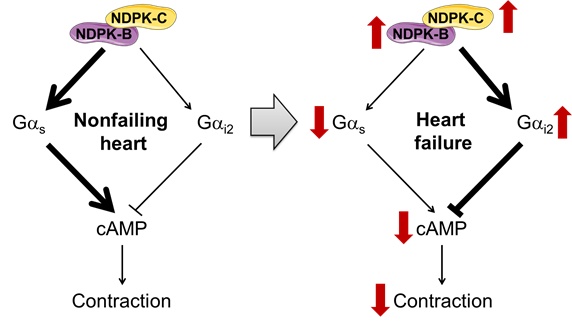Heart failure (HF) remains a common cause of death and disability and is associated with altered signal transduction via b-adrenoceptors and G proteins, resulting in reduced adenylyl cyclase-mediated cAMP formation and contributing to contractile dysfunction. Nucleoside diphosphate kinases (NDPKs) can modulate G-protein activity and are enriched at the plasma membrane of end-stage HF patients. However, their relevance for HF pathophysiology is largely unknown, particularly for the NDPK‑C isoform.
Together with collaborators from various centers in Germany and abroad, Jordi Heijman published a study in the most recent edition of Circulation, showing for the first time a potential critical role for NDPK-C in the suppression of cAMP formation in HF patients. In particular, this study identified that NDPK-C is crucial for the interaction between NDPKs and G proteins, building complexes and scaffolding them at the plasma membrane. These interactions regulate cAMP levels and cardiomyocyte contractility. In HF patients, NDPK-C switched from predominantly Gas stimulation to activation of Gai. Our findings provide a potential mechanism for the detrimental decrease in cAMP and related dysfunction previously described in HF patients, and position NDPK‑C as a novel critical determinant of bAR/cAMP signaling that contributes to impaired cardiac function and remodeling in human HF.

Reference: Abu-Taha IH*, Heijman J*, Hippe HJ, Wolf NM, El-Armouche A, Nikolaev VO, Schäfer M, Würtz CM, Neef S, Voigt N, Baczkó I, Varró A, Müller M, Meder B, Katus HA, Spiger K, Vettel C, Lehmann LH, Backs J, Skolnik EY, Lutz S, Dobrev D#, Wieland T# (2016) Nucleoside Diphosphate Kinase-C Suppresses cAMP Formation in Human Heart Failure. Circulation, Published online on Dec 7, 2016. *equally contributing first authors, #co-senior and co-correspondence authors – [PubMed]
